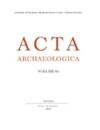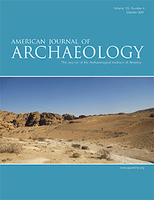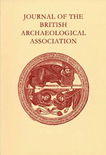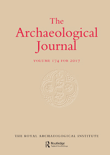
Pamatky Archeologicke
Scope & Guideline
Advancing archaeological knowledge through rigorous scholarship.
Introduction
Aims and Scopes
- Cultural Heritage and Archaeological Research:
The journal emphasizes the exploration of cultural heritage through archaeological findings, shedding light on historical contexts, social structures, and material culture. - Interdisciplinary Methodologies:
It encourages the use of diverse methodologies, including GIS, photogrammetry, archaeoanthracology, and other advanced techniques to enhance archaeological research and interpretation. - Chronological Diversity:
The journal covers a wide range of time periods from the Neolithic to the Medieval era, facilitating discussions on the evolution of cultures and societies over time. - Regional Focus:
While primarily focused on the Czech Republic, the journal also addresses broader Eurasian contexts, allowing for comparative studies that enrich the understanding of regional developments. - Thematic Studies:
It includes thematic studies on funerary practices, ritual contexts, and economic aspects of ancient societies, contributing to a deeper understanding of human behavior in historical contexts.
Trending and Emerging
- Digital Archaeology and GIS Techniques:
Recent publications indicate a significant rise in the use of digital tools for archaeological research, such as GIS and 3D modeling, reflecting a trend towards integrating technology in archaeological practice. - Ritual and Memory Studies:
There is an increasing focus on the exploration of ritual practices and memory in archaeological contexts, suggesting a growing interest in the social and cultural implications of these themes. - Interconnectivity Between Cultures:
Studies examining interactions and relationships between different cultural groups, particularly during the Late Bronze and Iron Ages, are becoming more prevalent, highlighting the importance of understanding cultural exchanges. - Environmental Archaeology:
Research that investigates the relationship between past human societies and their environments, such as archaeoanthracology and landscape studies, is on the rise, reflecting an interdisciplinary approach to understanding human-environment interactions. - Economic Aspects of Ancient Societies:
There is a growing trend towards analyzing the economic systems of ancient cultures, including trade and resource management, which underscores the importance of economic factors in shaping social structures.
Declining or Waning
- Traditional Excavation Reports:
There has been a noticeable decline in the publication of traditional excavation reports, possibly due to a shift towards more interpretive studies that contextualize findings within broader cultural narratives. - Narrow Temporal Focus:
Themes concentrating exclusively on specific, narrow time frames without broader contextual analysis are becoming less frequent, indicating a preference for integrative studies that span multiple periods. - Localized Studies Without Comparative Analysis:
Research that focuses solely on localized sites without drawing comparisons to other regions or cultures is diminishing, as there is a growing emphasis on understanding archaeological findings within wider historical and cultural frameworks.
Similar Journals

ACTA ARCHAEOLOGICA
Fostering Dialogue in Archaeological ScholarshipACTA ARCHAEOLOGICA is a highly regarded, peer-reviewed journal published by BRILL, focusing on the dynamic field of archaeology. With an ISSN of 0065-101X and an E-ISSN of 1600-0390, this journal disseminates innovative research, critical analyses, and comprehensive reviews that contribute to our understanding of human history, cultural heritage, and archaeological methodology. ACTA ARCHAEOLOGICA has excelled in its field, achieving a Q1 ranking in both the Arts and Humanities and Social Sciences categories for 2023, showcasing its impact and relevance in scholarly discourse. Though not currently open access, the journal caters to a diverse audience of researchers, professionals, and students, offering invaluable insights into archaeological studies from a global perspective. As it continues to foster academic dialogue, ACTA ARCHAEOLOGICA remains a cornerstone for those looking to deepen their knowledge and engage with cutting-edge archaeological research.

Conimbriga-Revista de Arqueologia
Championing Scholarly Exchange in Archaeology and HeritageConimbriga-Revista de Arqueologia is a distinguished open-access journal dedicated to the field of archaeology, published by COIMBRA UNIVERSITY PRESS. Since its inception, the journal has fostered a vibrant intellectual community focused on the exploration and dissemination of archaeological research, particularly emphasizing studies relevant to the rich historical and cultural heritage of Portugal and beyond. With its open access model established in 2014, it has become a vital resource for researchers, professionals, and students to share their findings without access barriers, encouraging collaboration and knowledge exchange. Despite the absence of specific metrics such as the HIndex and Scopus rankings, the journal is recognized for its commitment to high-quality scholarship and its role in advancing archaeological discourse. Positioned within the scholarly landscape, Conimbriga-Revista de Arqueologia serves as a crucial platform for the publication of innovative research, reviews, and critical essays, making it an essential journal for those invested in the archaeological sciences.

Annales Instituti Archaeologici
Uncovering the Past, Shaping the Future of ArchaeologyAnnales Instituti Archaeologici is a distinguished journal published by INST ARHEOLOGIJU, dedicated to advancing research in the field of archaeology. With an ISSN of 1845-4046 and an E-ISSN of 1848-6363, this journal serves as a vital platform for the dissemination of innovative archaeological studies and findings, reflecting the evolving trends and methodologies in this fascinating discipline. Based in Croatia, the journal captures a global audience, emphasized by its Q3 ranking in both Archaeology categories as per the latest 2023 metrics, indicating a solid presence in the academic landscape. Although it does not currently offer Open Access options, its impactful contributions are recognized through its Scopus ranks, where it stands at #137/413 in Archaeology related to Arts and Humanities and #135/354 in Social Sciences. Researchers, professionals, and students interested in the latest archaeological research and its applications will find Annales Instituti Archaeologici to be an invaluable resource, promoting knowledge and fostering scholarly communication within the archaeological community.

AMERICAN JOURNAL OF ARCHAEOLOGY
Transforming Excavations into Global KnowledgeThe American Journal of Archaeology (ISSN: 0002-9114, E-ISSN: 1939-828X), published by the esteemed University of Chicago Press, stands as a leading scholarly journal in the field of archaeology, celebrated for its rigorous peer-reviewed research. With an impressive impact factor that places it in the Q1 quartile for both archaeology and archaeology within the arts and humanities, this journal ranks among the top 15% in its field, according to Scopus metrics. It serves a global audience of researchers, professionals, and students, facilitating the dissemination of innovative findings from excavations, historical analyses, and methodological advancements. While primarily available through subscription, the journal's archives and features provide invaluable resources for deepening one's understanding of the past and engaging with current archaeological discourse. Operating from its home in Chicago, USA, the American Journal of Archaeology actively contributes to the advancement of knowledge and scholarship in archaeology, making it an essential platform for those invested in the exploration of ancient civilizations and cultural heritage.

Journal of the British Archaeological Association
Advancing Insights into Archaeological PracticesJournal of the British Archaeological Association is a prestigious publication in the field of archaeology, dedicated to fostering scholarly dialogue and advancing research related to Britain's rich archaeological heritage. Published by Routledge Journals, Taylor & Francis Ltd, this journal serves as a vital platform for researchers, professionals, and students alike, offering insights into archaeological practices and findings from the United Kingdom and beyond. With an ISSN of 0068-1288 and an E-ISSN of 1747-6704, the journal has a notable history spanning from 1980 to the present, contributing significantly to the academic community. Currently categorized within Quartile 4 for archaeology and visual arts, it serves as a resource for emerging researchers while promoting innovative perspectives in archaeology. Although it operates under a traditional subscription access model, the quality and depth of content delve into significant archaeological discussions, making it an essential read for those seeking to broaden their understanding of archaeological methodologies and theories. The association's commitment to preserving and interpreting archaeological data ensures that the Journal of the British Archaeological Association remains an indispensable resource for anyone passionate about uncovering the past.

Yorkshire Archaeological Journal
Charting the Archaeological Journey of YorkshireYorkshire Archaeological Journal, published by Routledge Journals, Taylor & Francis Ltd, stands as a pivotal resource in the field of archaeology, particularly focused on the rich heritage and archaeological research within the Yorkshire region of the United Kingdom. With a dedicated ISSN of 0084-4276 and an E-ISSN of 2045-0664, this journal provides both researchers and practitioners valuable insights into archaeological discoveries, methodologies, and theoretical frameworks. While it holds a Q3 ranking in both Archaeology (Arts and Humanities) and Archaeology (Social Sciences), its contributions remain significant for advancing discussions and knowledge within the discipline. The journal's archival depth, converging from as early as 1980 and continuing robustly into 2024, showcases a commitment to fostering academic discourse and exploration of archaeological heritage. Although it does not currently offer open access, its rigorous peer-reviewed articles make it an essential reference for academics, professionals, and students alike who are eager to deepen their understanding of archaeology and its applications.

Archaeological Journal
Advancing Knowledge, Preserving Our PastArchaeological Journal, published by Taylor & Francis Ltd, stands as a leading voice in the field of archaeology, with a remarkable distinction in the Q1 category for both arts and humanities as well as conservation, underscoring its critical role in advancing scholarly dialogue and research. With an ISSN of 0066-5983 and E-ISSN of 2373-2288, this journal provides a platform for innovative research from 1977, now offering insights up to 2024. The United Kingdom-based journal is highly regarded, being within the top 81st percentile in archaeology and conservation according to Scopus rankings. Essential for researchers, professionals, and students, the journal's content spans rigorous archaeological studies, theoretical advancements, and discussions on conservation practices, ultimately aimed at fostering a deeper understanding of humanity's past. Notably, with no open access option, it maintains a traditional publishing approach, thereby ensuring curated and high-quality contributions to the academic community.

Prilozi Instituta za Arheologiju u Zagrebu
Illuminating the archaeological landscape with impactful research.Prilozi Instituta za Arheologiju u Zagrebu is a prominent academic journal published by INST ARHEOLOGIJU, dedicated to advancing the field of archaeology and related historical studies. Operating in Croatia, this journal serves as a vital platform for scholars, researchers, and students to disseminate innovative research and insights within the realm of archaeology, with a focus on the rich cultural heritage of the region. The journal spans contributions from 2002 to 2011 and has ongoing publication since 2013, reflecting its commitment to contemporary archaeological discourse. With a growing reputation, it has achieved a Q3 ranking in the fields of Archaeology and Arts and Humanities, and a Q2 ranking in History, signifying its impact and relevance in the academic community. Although Open Access options are not available, the journal remains an essential resource for those pursuing in-depth knowledge and research in archaeology. Researchers can harness the journal's extensive scope to explore critical historical narratives and archaeological findings, solidifying its importance in both local and global contexts.

Stratum Plus
Fostering Academic Excellence in the Heart of MoldovaStratum Plus, published by HIGH ANTHROPOLOGICAL SCH UNIV, is a distinguished academic journal based in Moldova that focuses on the fields of Anthropology, Archeology, and History. With an impressive impact factor reflecting its stature—ranked in the Q2 category for both Anthropology and Archeology, and Q1 for Archeology in the arts and humanities—this journal is a vital resource for scholars, professionals, and students alike. The journal's comprehensive scope encompasses a wide array of interdisciplinary studies, making it a beacon for innovative research and critical discourse within these disciplines. Since its inception in 2014, Stratum Plus has strived to foster academic excellence and knowledge dissemination, thus playing a crucial role in shaping contemporary anthropological and archaeological thought. While currently not available as Open Access, the journal maintains a strong online presence, with access options available through institutional subscriptions. Located at ZIMBRULUI 10A ST, KISHINEV MD-2024, MOLDOVA, Stratum Plus invites contributors and readers to engage with cutting-edge research that continues to enrich the global academic community.

Revista de Arqueologia Historica Argentina y Latinoamericana
Innovative Insights into the Archaeological Treasures of Latin AmericaRevista de Arqueologia Historica Argentina y Latinoamericana is a vital scholarly journal dedicated to the field of archaeology, with a particular focus on the historical dimensions of Argentina and Latin America. Published by the Assoc Professional Archaeologists Argentine Republic, this open-access journal has been enriching the archaeological discourse since 2007, making its valuable content freely accessible to researchers, professionals, and students around the globe. With an ISSN of 1851-3190 and an E-ISSN of 2344-9918, the journal aims to foster a deeper understanding of the archaeological heritage of the region by publishing innovative research articles, critical reviews, and methodological advancements in the study of historical archaeology. Positioned as a prominent platform for scholarship, it plays a crucial role in advancing archaeological knowledge while promoting interdisciplinary approaches within the field.